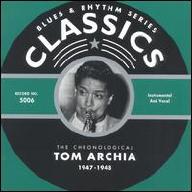Archia's college days added up to gaps between road tours. A band would come to town, and the eager tenor man would take off with it, only to have his father take off across Texas in order to track him down. He finally shipped out for good with Milt Larkin's band, a top Houston swing aggregation. In the reed section, Archia sat alongside Eddie Cleanhead Vinson, Jacquet, and Cobb. This band took on an epic run at Chicago's Rumboogie club, where big-shot bandleaders such asLionel Hampton and Cootie Williams came in and began picking off sidemen to join their own groups until Larkin finally had no choice but to disband in 1943. In the meantime, Archia had become settled in Chicago, where he stayed put. He got his first recording opportunity with a Roy Eldridge octet shortly after the Larkin job was finished. Archia came out to Los Angeles in the mid-'40s, meeting up once again with the Jacquet brothers. Archia's first collaboration on the West Coast was in bebop trumpeter Howard McGhee's combo. Members of the McGhee band also recorded behind blues shouter Wynonie Harris for Philo. In 1946, Archia led a band behind singer Dinah Washington. He returned to Chicago in the late '40s and continued recording in several different lineups for labels such asChess and Aristocrat, including his own sessions under the name of Tom Archia and His All Stars, which sometimes combined him with fellow tenor blaster Gene Ammons. He both toured and recorded with trumpeter Oran Hot Lips Page, including sessions backing up vocalists such as blues-great Lonnie Johnson and further work with Harris. His playing was more and more taken up with rhythm and blues gigs, yet he demonstrated plenty of jazz influence in his blowing, particularly that of Lester Young. In 1952, following a hiatus of several years, he returned to the studio to backup Dinah Washington in a group that also featured pianist Wynton Kelly and drummer Jimmy Cobb. He continued working with this vocalist for several years. Playing as the hornman in various Chicago organ trios began to be his scene in the late '50s, but he found it tougher to keep working in the '60s and by 1967, Archia was supposedly in dire straits. His sister brought him back to Houston to recuperate, and by the end of the decade, Archia was gigging all over town, even acquiring a new nickname, "the Devil." In 1973 he played in the Sonny Franklin Big Band, rejoining his old pal Arnett Cobb in the reed section. ~ Eugene Chadbourne, Rovi
Tom Archia
Biography
Tom Archia is a Texas tenor man that has been somewhat overlooked under the shadow of giants such as Herschel Evans, Illinois Jacquet, Arnett Cobb, or Booker Ervin. He was born Ernest Alvin Archia, Jr. and was generally known as "Sonny." "Tom," however, was the only thing that sounded right in terms of a name for a professional musician, and for a while he was even billed as Texas Tom. He started music lessons on violin, demonstrating an aptitude for picking up melodies by ear that must have impressed his mother enough so that she went the price of a saxophone when asked to. By his teenage years, the family was living in Houston in the district called the Fifth Ward, with Illinois and Russell Jacquet living right down the street. In high school, Archia studied under one Percy McDavid, who later became the Supervisor of Music in the Los Angeles school system. McDavid taught an eclectic repertoire to his orchestra classes, including Duke Ellington compositions. Archia's bandmates included Richie Dell on piano, the Jacquet brothers and Arnett Cobb on tenor saxophone, and others -- in other words, not the typical high school band. The high point for this group came in 1935 when Ellington himself visited the school to hear the orchestra.
Top Tracks
Albums
Videos
Close












